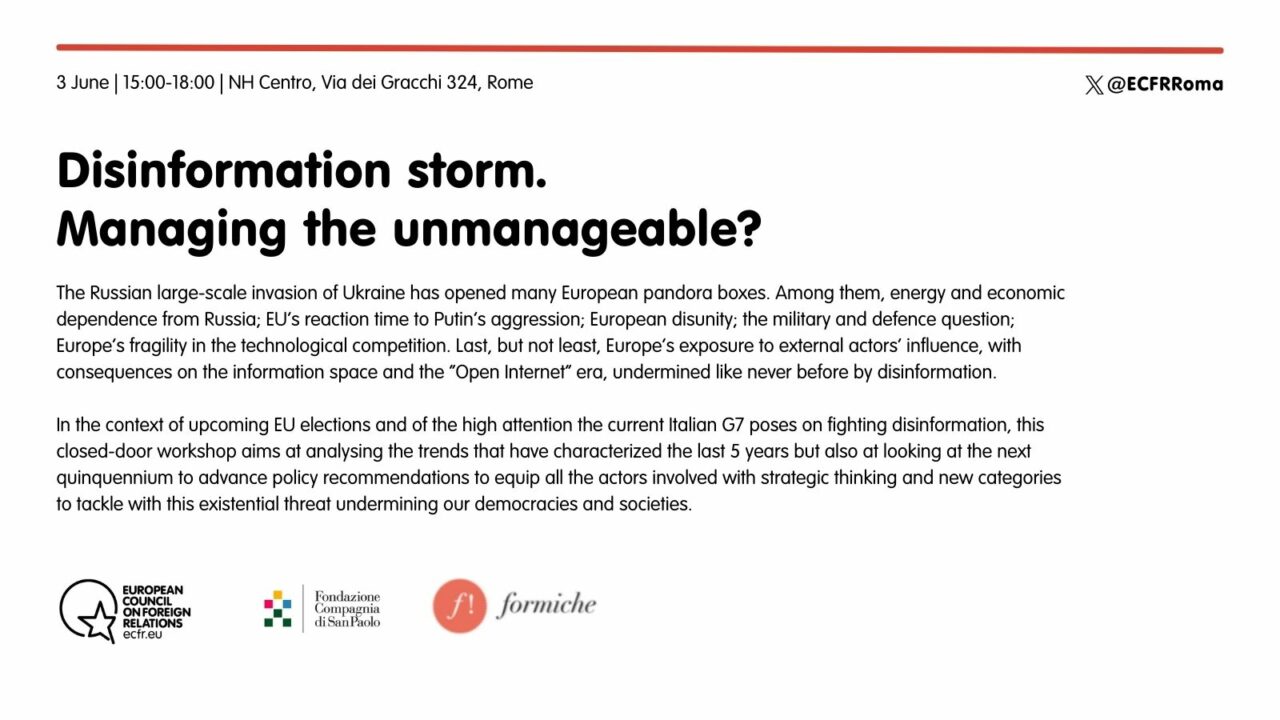Disinformation storm. Managing the unmanageable?
The Russian large-scale invasion of Ukraine has opened many European pandora boxes. Among them, energy and economic dependence from Russia; EU’s reaction time to Putin’s aggression; European disunity; the military and defense question; Europe’s fragility in the technological competition. Last, but not least, Europe’s exposure to external actors’ influence, with consequences on the information space and the “Open Internet” era, undermined like never before by disinformation
The Russian large-scale invasion of Ukraine has opened many European pandora boxes. Among them, energy and economic dependence from Russia; EU’s reaction time to Putin’s aggression; European disunity; the military and defense question; Europe’s fragility in the technological competition. Last, but not least, Europe’s exposure to external actors’ influence, with consequences on the information space and the “Open Internet” era, undermined like never before by disinformation.
In the context of upcoming EU elections and of the high attention the current Italian G7 poses on fighting disinformation, this closed-door workshop aims at analyzing the trends that have characterized the last 5 years but also at looking at the next quinquennium to advance policy recommendations to equip all the actors involved with strategic thinking and new categories to tackle with this existential threat undermining our democracies and societies.
Agenda
15:00-15:15 Arrival of participants and Welcome coffee
15:15-15:30: Welcome remarks and agenda setting
15:30-16:45 Panel 1 2019-2024: What went wrong, what went right. Dealing with the chameleonic nature of disinformation
This first session aims at having a 360 degree look at what has been done in the last 5 years in EU’s action on fighting disinformation. Disinformation has been used to polarize and divide European society, with the Covid19 pandemic and the Russian invasion of Ukraine becoming ideal springboards. We have also experienced AI’s increasing role in facilitating FIMI and false narratives. In this panel, our experts will dive into the chameleonic nature of disinformation; will look at EU’s strengths and achievements; but also, at the missing opportunities in sharing best practices and in fostering a united approach.
Chair: Gabriele Carrer, Journalist, Formiche
Speakers:
Cathleen Berger, Senior Expert, Future Technologies and Sustainability, Co-Team Lead Upgrade Democracy, Bertelsmann Stiftung
Alejandro Romero, Founder & CEO Alto Intelligence; ECFR Council Member
Giorgos Verdi, Policy Fellow, ECFR
16:45-18:00 Panel 2 2024-ONWARDS: New threats, new challenges. Looking for new antibodies?
2024 is the big electoral year, with about 4 billion global citizens heading towards elections. Among them EU citizens. If 2019 EU elections saw migration dominating the public discourse, this EU elections campaign has been very much fragmented and subject to many narratives as the Russian invasion of Ukraine; the war between Israel and Hamas; Taiwan; climate; economy; still Covid19. The EU elections will soon be over, and the Eu will take some time to set. In the meantime, new events, dynamics, targets and new spheres of influence. This session is then meant to be a strategic foresight exercise to identify and anticipate new possible disinformation tactics, trends, topics and tools and advance policy recommendations to meet these challenges.
Chair: Teresa Coratella, Deputy Head and Policy Fellow, ECFR Rome
Speakers:
Dominika Hajdu, Director, Centre for Democracy & Resilience, Globsec
Maia Mazurkiewicz, Head of StratCom, Alliance 4 Europe
Virginia Padovese, Managing Editor & Vice President Partnerships, Europe, Australia and New Zealand, NewsGuard Technologies
18:00-19:00 Wrap up and Networking Aperitif

